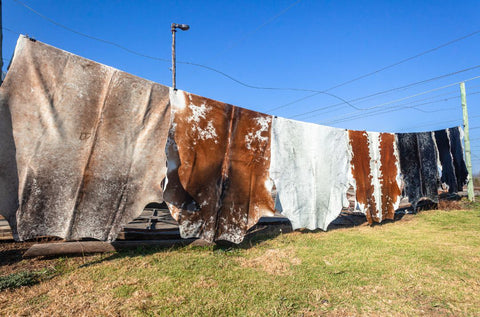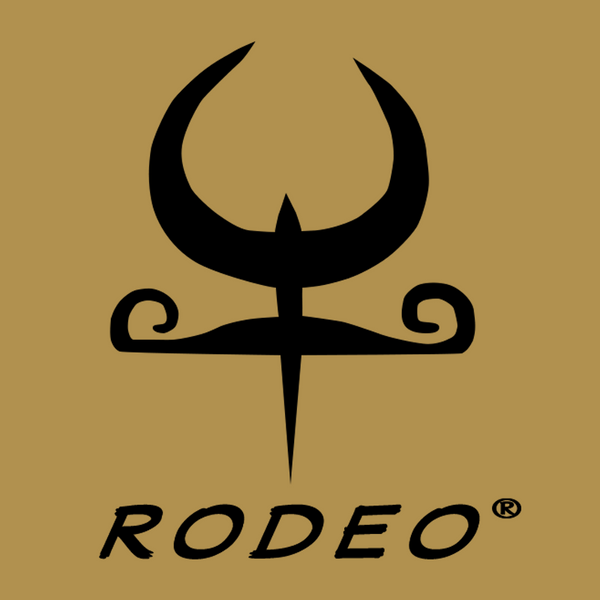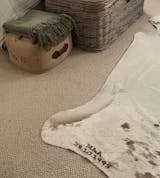
Why Does My Cowhide Rug Smell?
alicia bengenShare
Why Does a Cowhide Rug Smell and How Can You Get Rid of It?
Have you ever wondered about the distinct smell of a new cowhide rug? Just like any leather product, cowhide rugs have a natural scent that can be noticeable upon purchase. This blog explores why cowhide rugs smell, what contributes to their unique aroma, and how you can effectively minimize or eliminate it.
Why Do Cowhide Rugs Smell?
Cowhide rugs emit a smell similar to leather because they are indeed a leather product. The scent is a natural characteristic of the animal hide and is more pronounced when the hide is new.
A well-tanned cowhide rug should emit a scent similar to fresh leather. If your cowhide rug has a strong odor that smells chemical or perfumed, it may indicate that the tannery did not use the best ingredients. This is a crucial aspect to consider when assessing the quality of your rug.

What's That Smell?
The primary scent of a cowhide rug is due to the tanning chemicals used in processing the hide to preserve it and make it suitable for use as a rug. This smell is similar to the new car smell, which comes from new leather upholstery.
When you purchase a high-quality cowhide rug, it has been thoroughly cleaned and treated to reduce any unpleasant odors. Quality processing ensures that any natural scent does not equate to a bad smell but rather a fresh leather aroma.
Preferences vary; some people enjoy the smell of fresh leather, while others might find it overpowering. It's important to note that cowhide rugs with hair tend to have a stronger leather smell compared to other leather products like sofas, which are treated with special oils that reduce the scent.
The presence of a strong, unpleasant odor can be a sign of poor-quality tanning processes. For example, if a vendor claims the rug is Brazilian cowhide but it emits a weird, strong smell, this could indicate it's not of the best quality. In our previous discussions, such as in the blog "Is Brazilian Cowhide the Best?", we highlighted this as a key factor in determining the quality of cowhide rugs.
How to Get Rid of the Smell?
If the natural or chemical scent of your cowhide rug is not to your liking, here are some methods to reduce or eliminate it:

- Air Out : Hang the rug outdoors on a sunny day or in a well-ventilated area to allow the odors to dissipate naturally.
The smell of a new cowhide rug can intensify in a warm, closed environment during winter, as the heat prevents the rug from "breathing" properly. This usually occurs with newly tanned cowhides that haven't had sufficient time to air out. To alleviate this, you can take the rug outside for a few hours to let it air out. If the odor persists the next day, repeat the process as needed. Over time, airing it out will help diminish the odor.
- Rodeo Cowhide Shampoo: Clean before use your cowhide
Just like you would wash new sheets before using them, it's a good idea to clean a new cowhide rug. Fortunately, cleaning a cowhide rug is quick and easy, typically taking just 1-3 minutes. Using a specialized product like rodeo cowhide shampoo can refresh and reactivate the beautiful shine of your cowhide. This not only enhances the fur's shine but also leaves your rug with a pleasant smell.

- Use Carpet Refresher: If your cowhide rug has only a mild odor, using a carpet refresher can be an effective solution. Carpet refreshers are designed to cover and neutralize odors, making them a convenient choice for quickly improving the scent of your rug.
- Use Activated Charcoal: Place bowls of activated charcoal around the rug to help absorb foul odors.

As we conclude our exploration into the distinct aromas associated with cowhide rugs, remember that understanding these scents can enhance your appreciation and maintenance of this unique decor item. Have you ever wondered why your cowhide rug smells the way it does?




